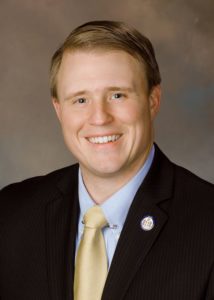
RICHMOND — A bill that would give Virginia police power to search private computers without a secondary search warrant was tabled after a committee determined the bill’s language failed to protect Fourth Amendment rights.
According to Delegate Mike Webert, R-Marshall, who is chief patron of the bill, the purpose of the bill “is not more money and power.”
Webert said his bill was meant to “streamline the process” of searching through a citizen’s computer, by eliminating the need for two warrants.
“A lot of times, what will happen is somebody (police) will go, and they will confiscate a computer looking for child porn – then they need to go and get another search warrant to search inside the computer,” Webert said. “We just wanted to streamline the process so that they (police) could go ahead and look into the computer.”
The bill first became problematic when it was written to include entire public networks or households, which would have enabled immediate searches upon seizure of any number of personal computers in a household.
After narrowing down the bill’s language to apply only to the personal computers of a certain individual, the House criminal law subcommittee determined there still were Fourth Amendment problems, which only can be addressed during the 2015 session, once the language is changed again.
“It has nothing to do with giving (police) more power,” Webert said in a mid-January interview. “It has nothing to do with that.”
He later said he highly doubts state police would have requested the bill with the intention of subverting Fourth Amendment rights.
However, Lt. James Hartman of the Fauquier County Sheriff Department said the bill would “absolutely” give police more power to investigate computers.
Hartman said the legislation would afford his department new powers to solve computer crimes including fraud and embezzlement, but “first and foremost,” he said the legislation would expedite police power to prosecute crimes against children, such as child sex abuse.
“We don’t have a computer lab here at Fauquier,” Hartman said, “so we almost always rely on partners in jurisdictions next door, and other counties to help with these examinations.”
The bill went before the Joint Commission on Technology and Science in December, which addressed Fourth Amendment and privacy issues. Present at the discussions were state police, the commonwealth’s attorney, prosecutors, the attorney general’s representatives and representatives from AOL, Facebook and Google.
Webert said he understands the corporations represented are known to be complicit with Fourth Amendment rights violations. He said the language of the bill changed dramatically after the corporate reps expressed privacy concerns.
The bill originally was requested of the McDonnell administration by the state police, said Delegate Kenneth R. Plum, D-Reston, as a means for expediting investigations into computer crime by removing the need for a secondary warrant to search a computer. Currently, probable cause must be established to obtain both warrants.
“It (the bill) dealt with a very practical problem they (police) had,” Plum said. “They sometimes needed to take it (a computer) to some place other than where they may originally have taken it for a warrant, and that was simply because I think the technology support they need, they don’t have every place in the state.”
Virginia already sends guns and drugs to labs without a second warrant, and Webert said computers are different. He said he wanted the language to reflect that
“To get gun particles off of a gun that had been fired doesn’t need a second search warrant,” he said. “Whereas computers – due to the new digital age – it’s the same but different.”
Webert said he wants to help police catch child pornographers, who keep illegal images on their computers. He said there were magistrates who complained about needing a secondary warrant to search through files on a suspect’s computer.
However, Webert also said he could not recall any specific case in which a magistrate said the procurement of a secondary search warrant became problematic to an investigation.
The resolution was to narrow the bill’s terminology to individual users on a given network and not to include the network of an entire business or household, Webert said.
“The language originally had ‘network,’” Webert said, “and (when) other people (are) using a network, there’s risk of invading their privacy.”
This story appeared in The Southwest Times and The Virginia Free Citizen.
